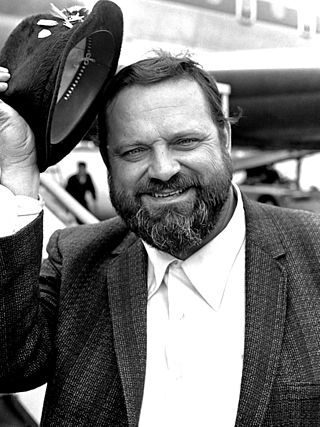
Alois Maxwell "Al" Hirt was an American trumpeter and bandleader. He is best remembered for his million-selling recordings of "Java" and the accompanying album Honey in the Horn (1963), and for the theme music to The Green Hornet. His nicknames included "Jumbo" and "The Round Mound of Sound". Colin Escott, an author of musician biographies, wrote that RCA Victor, for which Hirt had recorded most of his best-selling recordings and for which he had spent most of his professional recording career, had dubbed him with another moniker: "The King." Hirt was inducted into The Louisiana Music Hall of Fame in November 2009. He received eight Grammy nominations during his lifetime, including winning the Grammy award in 1964 for his version of "Java".
"The Song from Moulin Rouge", sub-titled "Where Is Your Heart", is a popular song that first appeared in the 1952 film Moulin Rouge. It became a No. 1 hit in the UK Singles Chart when recorded by Mantovani. The music for the film was written by Georges Auric; the original French lyrics were by Jacques Larue, with the English words by William Engvick. The Auric-Engvick song was published in 1953.
"Till There Was You" is a show tune written by Meredith Willson, popularised by his 1957 stage production The Music Man and its 1962 movie musical adaptation, and further popularised by the Beatles cover.
"When the Saints Go Marching In", often referred to as simply "The Saints", is a traditional black spiritual. It originated as a Christian hymn, but is often played by jazz bands. One of the most famous jazz recordings of "The Saints" was made on May 13, 1938, by Louis Armstrong and his orchestra.
"Panama" is a jazz standard. It is by William Henry Tyers, originally entitled "Panama, a Characteristic Novelty", published in 1912.
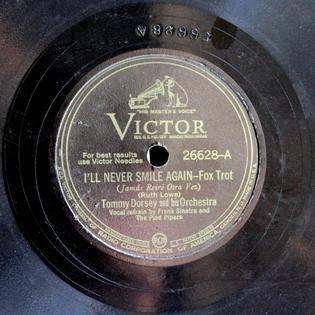
"I'll Never Smile Again" is a 1939 song written by Ruth Lowe. It has been recorded by many other artists since, becoming a standard.
"When It's Sleepy Time Down South", also known as "Sleepy Time Down South", is a 1931 jazz song written by Clarence Muse, Leon René and Otis René. It was sung in the 1931 movie Safe in Hell by Nina Mae McKinney, and became the signature song of Louis Armstrong, who recorded it almost a hundred times during his career. The song is now considered a jazz standard and it has been recorded by a plethora of artists. A popular recording in 1931 was by Paul Whiteman and his Orchestra.
"Muskrat Ramble" is a jazz composition written by Kid Ory in 1926. It was first recorded on February 26, 1926, by Louis Armstrong and his Hot Five, and became the group's most frequently recorded piece. It was paired on the flip side with another one of Armstrong's hits, "Heebie Jeebies." It was a prominent part of the Dixieland revival repertoire in the 1930s and 1940s, and was recorded by Bob Crosby, Roy Eldridge, Lionel Hampton, Woody Herman, Muggsy Spanier, Chet Atkins, Lu Watters, the Andrews Sisters, Harry James, and Al Hirt, among others. It is considered a part of the jazz standard repertoire.
"Last Date" is a 1960 instrumental written and performed by Floyd Cramer. It exemplifies the "slip note" style of piano playing that Cramer made popular. It peaked at number 11 on the country chart and at number two on the Hot 100 behind "Are You Lonesome Tonight?" by Elvis Presley. Cramer's recording inspired a number of successful cover versions, including a vocal adaptation by Conway Twitty.
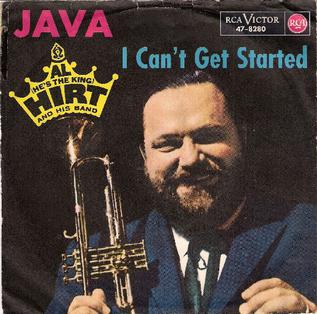
"Java" is an instrumental adaptation from a 1958 LP of piano compositions, The Wild Sounds of New Orleans, by Tousan, also known as New Orleans producer/songwriter Allen Toussaint. As was the case of the rest of Toussaint's LP, "Java" was composed in studio, primarily by Toussaint.

He's the King and His Band is the first album by Al Hirt to be released by RCA Victor. The album was recorded at RCA Victor's Studio A in New York City.

Cotton Candy is an album by Al Hirt that was released in 1964 by RCA Victor. The album features the Anita Kerr Singers.

Honey in the Horn is an album by Al Hirt released by RCA Victor. The album was produced by Chet Atkins and Steve Sholes. The Anita Kerr Singers provided the vocals for the album. The backing band on the album consisted of saxophonist Boots Randolph, bassist Bob Moore, guitarists Ray Edenton and Grady Martin, and pianist Floyd Cramer.

Sugar Lips is an album by Al Hirt released in 1964 by RCA Victor.
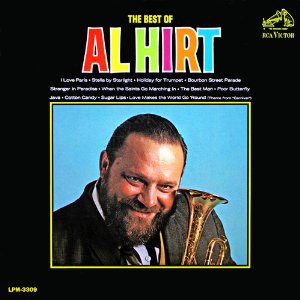
The Best of Al Hirt is a compilation album by Al Hirt released by RCA Victor in 1965. The album peaked at No. 13 on the Billboard Top LPs chart.
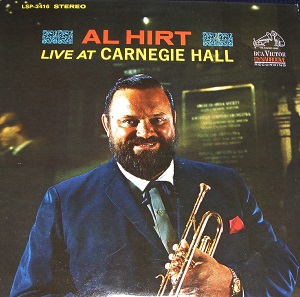
Live at Carnegie Hall is a 1965 live album by Al Hirt released by RCA Victor recorded at Carnegie Hall. The album was produced by Jim Foglesong arranged by Gerald Wilson.

That Honey Horn Sound is an album by Al Hirt released by RCA Victor in 1965. The album was produced by Chet Atkins and arranged by Anita Kerr and Claus Ogerman.
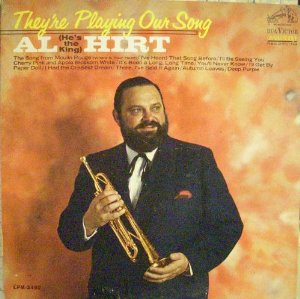
They're Playing Our Song is an album by Al Hirt released by RCA Victor in 1965. The album was produced by Jim Foglesong. It was recorded at Webster Hall in Manhattan, New York City.

"Night Life" is a song written by country music singer-songwriter Willie Nelson. Nelson was inspired to write the song during one of his trips from his home in Pasadena, Texas, to his work, singing at the Esquire Ballroom in Houston.
Alton Reynolds Hendrickson was an American jazz guitarist and occasional vocalist.












